- Home
- Christie Golden
On Fire’s Wings Page 10
On Fire’s Wings Read online
Page 10
“Maluuk, prepare him for the pyre. Jashemi, find his mount and fetch the messages he said he carried.”
“Yes, Father.” Jashemi headed for the door. Impulsively, Kevla followed. They stood outside the door, hands raised to shield their eyes from the sun as they tried to see where Sammis’s mount had gone. Kevla realized she didn’t know if they should be looking for a horse or a sa’abah.
“You should not be seen with me,” hissed Jashemi, barely moving his lips.
The rebuke stung. She had thought…she had been foolish to think it.
“Two sets of eyes are better than one,” she replied stubbornly. “I am a servant assisting the khashimu.”
“Curse you, Kevla, it’s more than that,” Jashemi said, but did not elaborate. “There. It sought out the company of other sa’abahs.”
The exhausted beast, a female, had indeed tried to join the herd of the House of Four Waters. They found her pacing mournfully back and forth outside the stone corral, bleating plaintively as she scented water and others of her own kind on the other side. Tahmu’s sa’abahs had come up to her and were nuzzling her, their muzzles barely clearly the wall.
She started when Jashemi and Kevla hurried up to her, but Jashemi dove for the trailing reins. He spoke softly to the creature, patting her neck and sending a small cloud of dust into the air.
“Down, down,” he urged the sa’abah, tugging on the reins. Obediently, she crouched so that Jashemi could reach the saddle and the small bundle tied securely to it. So tightly was the leather pouch bound to the saddle that Jashemi had to use the small knife he always wore to cut it free. He removed the saddle, opened the gate, and let the exhausted sa’abah inside. She headed straight for the trough, lowered her head, and began to drink. The others crowded around her, reaching to touch her with their small, stubby arms, as if they understood that she had been through a terrible ordeal.
Although she had lived at the House for some time now, Kevla still found the sa’abahs fascinating, and watched them as Jashemi fumbled through the sack. She heard a rustling, then silence, then a deep sigh.
She turned around just in time to catch him wiping his eyes with his sleeve. Her heart ached in sympathy. Without thinking she touched his arm gently.
Jashemi jerked away, and immediately Kevla dropped to her knees. Again, she had assumed too much.
“Forgive me, young lord! I transgressed, I did not mean—”
A gentle hand on her shoulder urged her to rise. “It’s all right,” he assured her. “I just….”
“What does the letter say?”
His face crumpled and he looked down. “My uncle and all of my male cousins are dead. Slaughtered while they slept off the wine they had drunk in celebration of Kur.”
Kevla listened, remaining silent.
Jashemi cleared his throat and continued in a more normal tone of voice. “The women were…were assaulted and then taken. Probably they are five-scores now. My cousin Sammis was sent by my uncle to summon help.” He looked at her now, and she did not like the expression on his face. “The first thing the raiders did was burn the aerie, so that no warning hawks could be sent out to gather reinforcements. The Sa’abah Clan has probably taken what they want and are long gone.”
“The Sa’abah Clan?” Kevla repeated, incredulous. She looked over at the milling creatures. They seemed gentle, intelligent. They had welcomed a stranger.
“It is ironic that the people who breed the most peaceful of animals are the ones most thirsty for blood,” said Jashemi, bitterly. He looked down at the parchment in his hand. Kevla followed his gaze and saw that he had crumpled the missive.
Jashemi composed himself. “We will attack in retaliation. Father will want to see this. Return to the House, Kevla. My mother will be distraught to hear of the death of her brother.”
Without another word he turned and trudged slowly back toward the healer’s hut. Kevla wanted to follow. She had no desire to be in Yeshi’s company when the khashima received such dreadful news.
For the third time in the span of a few months, the House of Four Waters was thrown into a flurry of activity. This time, though, the preparations were not for a welcome-home feast, or the wild celebration of a favorite holiday, but for battle.
Kevla continued her lessons in healing. Maluuk explained that he would be going with the warriors, as his skills would be needed to treat the injured.
“And there will be,” he said, seeming suddenly very old. “There are always injured. Too many, even in a victory.”
Asha would stay behind, to assume his master’s position. Kevla would become his apprentice, assisting him in treating the household and preparing bandages, salves, ointments, and tinctures. Although it was uncommon for a woman to be placed in such an important position as apprentice healer, the usual niceties could not be observed. Asha seemed happy enough to take on the role of a full healer, and apparently didn’t object to Kevla’s gender.
She had always looked upon these sessions as play, an escape from the world of the household, a time to be with Jashemi. But Jashemi no longer attended the lessons, as he would be expected to accompany his father into battle. Her time with Maluuk had a new sense of urgency to it, and there was no more play involved.
Still, it was better than being with Yeshi. Kevla had not been present when Tahmu had told his wife that her brother was murdered and her nieces and nephews dead or captured. But she had heard the scream of anguish as she waited outside the door, and exchanged helpless glances with Tiah and Ranna. For the first time, she had felt a kinship with the other women as they listened to their mistress shriek and sob.
For nearly a day, Yeshi would not speak to them. She permitted them to bring her food, but nothing more, and she never looked at them when they entered quietly. When at last she did rouse herself to let them bathe and dress her, there was a new harshness to her mien. The three women moved quietly around their mistress, frightened for themselves, frightened for their household.
The war party was assembled with astonishing rapidity. The warriors would need to travel well and quickly, as the Sa’abah Clan was nomadic. Every bit of preserved food was brought forth and packed, and dozens of animals were slaughtered to replenish the stores. Weapons were brought out of storage, sharpened, cleaned, repaired, and set aside. Craftsmen worked from sunrise to sunrise making more arrows, more swords, more knives. Falcons flew back and forth from the House, as Tahmu called in his allies and they responded.
They trickled in, clan by clan, and Kevla gaped in amazement at the numbers. Within a few days, over five hundred men from the Sheep Clan, the River Clan, the Horserider Clan, the Star Clan, and the Cattle Clan had arrived to assist the Clan of Four Waters. None of the household’s women had a chance to visit the caverns, as they were constantly teeming with warriors set on enjoying the House of Four Waters’ famous bathing pool before they left for battle.
Kevla would have been glad to see them go had not she feared for Jashemi and Tahmu. What would happen if either one of them was killed? If both were killed? The thought was so dreadful that Kevla always drove it from her mind. But at night, she had dreams, and though she never remembered them, she would awaken with tears on her face.
The night before the warriors were to depart was not marked by revelry. It was too grim an occasion. Yeshi had dismissed her women and Kevla, wanting to do something to help, assisted in distributing freshly-filled waterskins to the men camped out on the grounds.
They were all of a kind: angry-looking or solemn-faced men, clad not in finery but in weather-worn rhias, who barely acknowledged her presence, though they took the waterskins she offered readily enough. They were crowded together, and Kevla heard conversations consisting of low mutterings and angry cries, the jingling of tack, the crackle of small fires. There was a smell of leather, fur, and sweat that after an hour or so made her stomach roil.
She had turned and was headed back to the House for more waterskins when a hand clamped down on her arm. She start
ed to cry out, but turned and saw that it was Jashemi. He held a finger to his lips and she nodded. He tugged on her arm, leading her away from the bustle of the House.
Kevla trotted after him, confused and a little alarmed. Why would the khashimu want to see her alone, at night? Finally, Jashemi stopped.
“We are far enough away, we won’t be overheard. And the moon is new.”
Kevla kept her gaze on the ground. “What does my lord wish?” she asked.
“To apologize.”
She was so startled that her head whipped up and she stared at him. “My lord, a khashimu never apologizes to a servant!”
“But Jashemi can and will apologize to Kevla,” Jashemi countered. She had no response, merely looked at him in confusion. What was going on?
She heard him swallow. “You felt sorry for me the day that Sammis came. You wanted to help. I was rude to you. I wish I could explain why. Maybe someday.”
Kevla lowered her eyes again. “I do not understand.”
“I saw the hurt on your face,” he said gently, stepping closer to her. She felt the soft puff of his breath on her cheek. “When I said you shouldn’t be with me.”
“My lord, you were right to say that. I overstepped.”
He made an annoyed sound. “Kevla, please let me apologize!”
“Of course. As the khashimu wishes.”
There was a pause. Then he said, “I am leaving tomorrow. Will—will you miss me?”
Her heart almost stopped. “Of course. I shall say prayers for the safety of my lord and my lord’s son.”
“Kevla, I—” She would not—could not—look at him. She knew what he wanted to hear, and she couldn’t speak it. Not when she was Bai-sha and he was khashimu.
“Never mind. I’m sorry. I shouldn’t have brought you here. I don’t know what I was—” He turned and strode off.
Kevla’s knees buckled and she fell hard to the earth. A quick sob escaped her and she clapped her hand over her mouth. He was already several paces away, but somehow he heard the soft sound. Kevla huddled on the sand, her head on her hands, willing him to go away. Before she realized what he had done, he was on his hands and knees in front of her.
“Kevla, talk to me,” he implored.
She mustn’t say it. She mustn’t say anything. But the words seemed to have a life of their own.
“I’m afraid,” she whispered. “I’m so afraid something will happen to you.”
“Look at me,” he said. She did, and found his face seemed blurry to her. She wiped angrily at the telltale tears. “I know you’re afraid,” he said softly. “I am, too. So is Father, and so are all the men. We all know we could be riding to our deaths.”
He swore suddenly, a harsh curse that startled Kevla. “I hate these stupid raids! Why must people die like this? My uncle was not the most admirable of men, but he did not deserve to have his throat cut while he slept!”
“Perhaps the Sa’abah Clan—” began Kevla.
“It’s not just them,” he snarled. “It’s all of them. We could just as easily be riding against the Star Clan or the Horserider Clan tonight as riding with them. They’re our allies now, but we’ve fought them in the past. And we have allied with the Sa’abah Clan, and look what they’ve done.” He continued to fume in silence, his lips pressed together in a thin line of anger.
“Come back,” said Kevla, softly, shocked by her boldness.
His eyes searched hers, then he startled her by reaching out and taking her hands in his. Their palms pressed together, hot and moist in the darkness. Tears continued to slip down her cheeks. He leaned forward, releasing one hand to wipe the tears from her face with an odd mixture of grace and clumsiness. Starlight caught the glitter of tears in his own eyes.
“I will come back,” he said firmly.
“But only the Great Dragon knows our destinies,” she replied, her voice catching on the words.
Jashemi placed one hand on either side of her face, forcing her to look into his eyes.
“We are not done with each other yet,” he said fiercely. “I don’t know my destiny, but I know this much. I can feel it. Can’t you?”
As she gazed into his eyes, she felt a sudden lightening. Her tense muscles eased, relaxing so that she almost slumped. He was right. Somehow, in a way that surpassed her understanding, she knew that he was right. What she felt swirling inside her now was not something as frail as hope. It was swift, certain knowledge.
Some would die in this retaliatory raid. Perhaps people she knew. Perhaps even Tahmu.
But not Jashemi.
We are not done with each other yet.
Chapter Nine
The warriors departed the next morning. Kevla had lined up with the other servants to watch the warriors march through the courtyard and down the road that led past the twining Four Waters and beyond.
As the ones who had issued the rallying cry, the members of the Clan of Four Waters were the last ones to depart. Kevla stood properly clad in the veil in front of so many male strangers at such a formal function. Most rode horses, a very few rode sa’abahs—Ranna nudged Tiah and muttered, “They’ll likely come home with more of those”—and many walked. They almost danced as they passed, and the crowd cheered and whistled.
“It’s as if they are going off to a game,” Kevla said softly.
“No game,” Sahlik sighed, “but you would not know it. Here come our people.”
Tahmu, proudly astride Swift-Over-Sand, led the procession. Beside him on a sa’abah rode Jashemi. Neither whooped or danced, although some of the other clansmen did. Tahmu smiled reassuringly at the assembled crowd of wives, children, and servants, and Jashemi emulated his father. He did not meet Kevla’s gaze.
Yeshi stood at the gate. Kevla had helped her with her cosmetics that morning, but it was obvious the khashima had been crying in the intervening time. The kohl that had encircled her dark eyes had run down her face and been wiped away, smearing both the rivulet of black and the red rouge of the great lady’s cheeks so that Yeshi almost appeared to have been assaulted. Her full, red lips trembled and her eyes were bright with tears. She wore no veil; as the highest ranking female present, the only one who outranked her was her husband.
Tahmu dismounted and embraced his wife. She hugged him, but it was for her son that Yeshi reserved her fiercest affections. She dropped to her knees and clung to him, the tears again flooding her face with black streams of grief. Jashemi wiped the tears away, as he had done with Kevla last night, and his expression as he regarded his mother was one of deep compassion. Kevla was too far away to hear what Yeshi said, but as the minutes passed and Yeshi did not rise nor release her son, she could feel the tension in the crowd.
Sahlik moved quickly toward her mistress, stepping behind Yeshi and placing her hands on her shoulders. Jashemi gently disengaged himself. Tahmu whispered something to his wife, who brightened and put a beringed hand on her gently swelling belly. She straightened and stepped away from husband and son.
They rode out, and as the gates closed behind them, Kevla felt a dreadful hollowness in her chest.
Yeshi stepped forward. “In the absence of the khashim, his Second, and the heir,” she said, her voice thick with grief but surprisingly strong, “all orders will come from me. The first order I will issue as present leader of the Clan of Four Waters is that every day we will petition the Great Dragon with offerings, so that he will be moved to bring our men safely home.”
A murmur of approval went up. Yeshi nodded, pleased. “We will begin today.”
The days dragged by. Yeshi did not seem to have a great deal of time for her women during the day, though at night she was more exhausted than Kevla had ever seen her. At that time, she wanted all three of them to massage her swollen feet, rub oil on her growing belly, and speak softly and kindly to her.
Each day, Kevla went to the aerie, to see if there were any messages from the war party. Sometimes there were, but the hawk master would hardly reveal their precious contents t
o so lowly a servant, although as Kevla’s appearance became a regular occurrence, he grew fond of her. Sometimes Yeshi would share the news, sometimes not.
Kevla’s lessons with Asha continued. He was particularly anxious for her to learn about childbirth, in case Yeshi’s baby came before Maluuk and the others returned. While happy to be trusted with such information, Kevla found the hours spent in the healer’s hut only served to emphasize Jashemi’s absence.
Days stretched into weeks, and then months. Celebration days came and went, and Yeshi presided over the revelry. Although the unctuous Bahrim flirted heavily with the khashima—and he was not alone among the uhlals casting glances at the beautiful great lady—Yeshi’s growing belly seemed to discourage further improper advances. With each moon she tired more easily, and spent more time sleeping. Asha and Kevla examined her every day, and at one point Asha announced with certainty, “The child could come very soon.”
Yeshi shook her head. “The child will not come until his father returns home.”
Asha bit his lip, hesitant to disagree, and finally said diplomatically, “Then let us pray that that day will be soon.”
Not long after that, Kevla was in Yeshi’s chambers, watching the morning processional heading out to the House’s altar. Though she had never visited it, she knew that it was some miles distant. Each clan had an altar at the foot of the nearest mountain. The entire chain was sacred to the Great Dragon, and never to be crossed, although of course Mount Bari was the mighty creature’s home. Some clan altars were only for show, but Tahmu-kha-Rakyn had always been particularly devout and eager to placate the Dragon. Household gossip held that this was why the House of Four Waters was so prosperous. His wife continued the tradition in her husband’s absence, and each morning the party left, laden with gold, food, sweet herbs, jugs of water, and wine, all to please the Dragon. As her eye followed them, watching the group growing smaller as they headed down the road, Kevla noticed movement in the sky. She squinted against the sunlight, already harsh though it was still early, and saw that it was a bird.

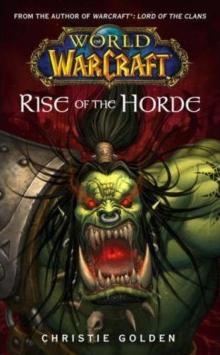 Rise of the Horde
Rise of the Horde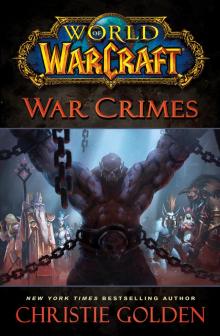 World of Warcraft: War Crimes
World of Warcraft: War Crimes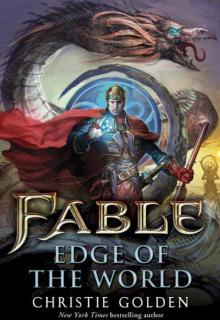 Fable: Edge of the World
Fable: Edge of the World Homecoming
Homecoming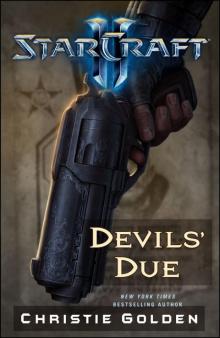 StarCraft II: Devil's Due
StarCraft II: Devil's Due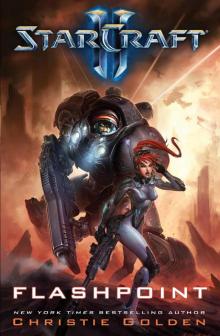 Starcraft II: Flashpoint
Starcraft II: Flashpoint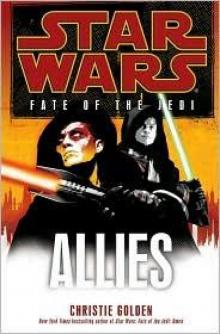 Allies
Allies Shadow Hunters
Shadow Hunters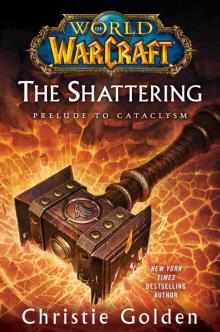 The Shattering: Prelude to Cataclysm wowct-1
The Shattering: Prelude to Cataclysm wowct-1 STAR TREK: VOY - Homecoming, Book Two - The Farther Shore
STAR TREK: VOY - Homecoming, Book Two - The Farther Shore King's Man and Thief
King's Man and Thief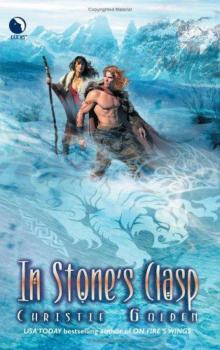 In Stone's Clasp
In Stone's Clasp Jaina Proudmoore: Tides of War
Jaina Proudmoore: Tides of War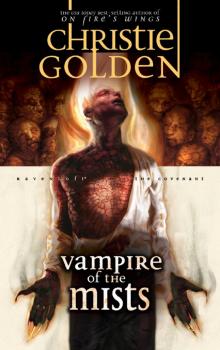 Vampire of the Mists
Vampire of the Mists Star Wars: Fate of the Jedi II: Omen
Star Wars: Fate of the Jedi II: Omen King's man and thief cov-2
King's man and thief cov-2 Star Trek
Star Trek StarCraft: Dark Templar: Twilight
StarCraft: Dark Templar: Twilight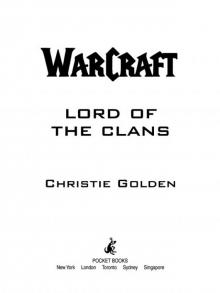 Lord Of The Clans
Lord Of The Clans ARKTIKA.1 (Short Story)
ARKTIKA.1 (Short Story)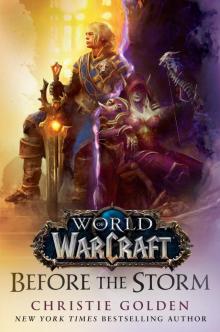 Before the Storm
Before the Storm STAR TREK: VOY - Homecoming, Book One
STAR TREK: VOY - Homecoming, Book One Shadow of Heaven
Shadow of Heaven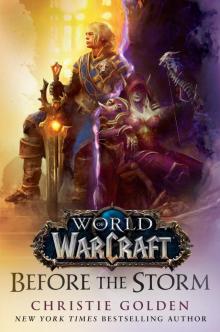 Before the Storm (World of Warcraft)
Before the Storm (World of Warcraft)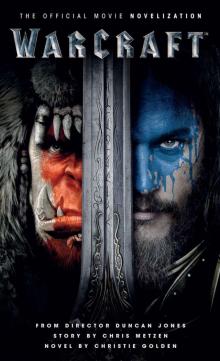 Warcraft Official Movie Novelization
Warcraft Official Movie Novelization Flashpoint
Flashpoint STAR TREK: The Original Series - The Last Roundup
STAR TREK: The Original Series - The Last Roundup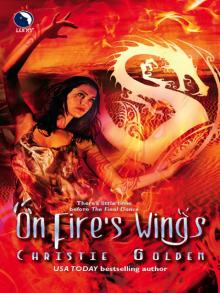 On Fire’s Wings
On Fire’s Wings Spirit Walk, Book One
Spirit Walk, Book One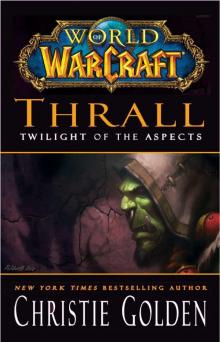 Thrall Twilight of the Aspects
Thrall Twilight of the Aspects Valerian and the City of a Thousand Planets
Valerian and the City of a Thousand Planets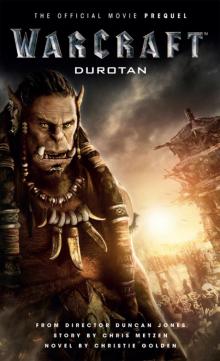 Warcraft
Warcraft Assassin's Creed: Heresy
Assassin's Creed: Heresy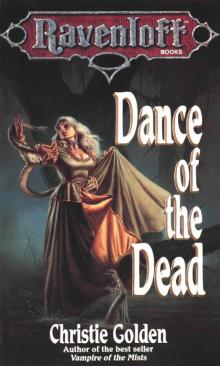 Dance of the Dead
Dance of the Dead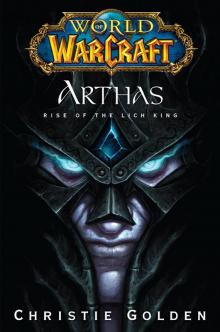 Arthas: Rise of the Lich King wow-6
Arthas: Rise of the Lich King wow-6 Assassin's Creed: The Official Movie Novelization
Assassin's Creed: The Official Movie Novelization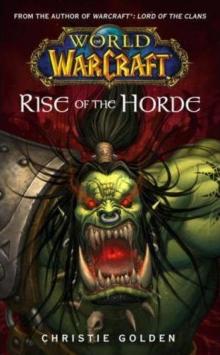 Rise of the Horde wow-2
Rise of the Horde wow-2 Dark Disciple
Dark Disciple Ghost Dance
Ghost Dance The Shattering
The Shattering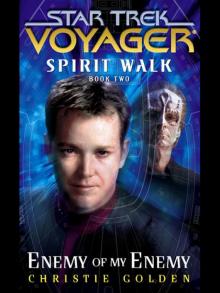 Spirit Walk, Book Two
Spirit Walk, Book Two Star Wars: Fate of the Jedi: Ascension
Star Wars: Fate of the Jedi: Ascension Star Wars: Fate of the Jedi V: Allies
Star Wars: Fate of the Jedi V: Allies The Enemy Within
The Enemy Within Kindred Spirits
Kindred Spirits The Farther Shore
The Farther Shore Star Trek: Hard Crash (Star Trek: Starfleet Corps of Engineers Book 3)
Star Trek: Hard Crash (Star Trek: Starfleet Corps of Engineers Book 3) Twilight
Twilight